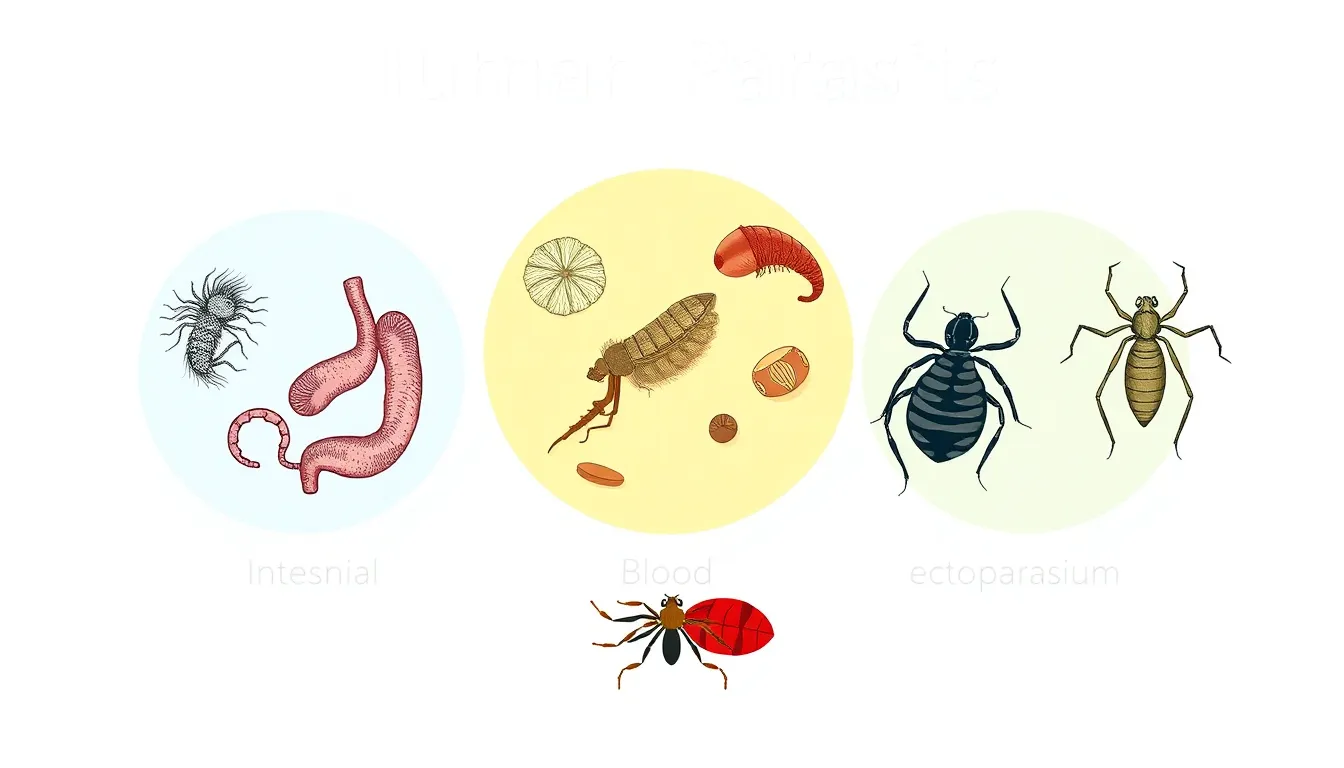Parasites are more common in humans than many realize, often lurking in the shadows of everyday life. They can invade the body through contaminated food, water, or even insect bites, leading to a range of unsettling symptoms. Recognizing the signs of a parasitic infection is crucial for timely treatment and recovery.
From unexplained weight loss to persistent fatigue, these symptoms can easily be mistaken for other health issues. It’s essential to stay informed about the potential indicators of parasites to safeguard one’s health. By understanding these signs, individuals can take proactive steps toward diagnosis and treatment, ultimately reclaiming their well-being.
Table of Contents
ToggleOverview of Parasites in Humans
Parasites in humans are organisms that thrive by feeding on the host. These pathogens can infiltrate the body via contaminated food, impure water, or bites from infected insects. Common types include protozoa, helminths, and ectoparasites. Each subtype displays unique characteristics and can lead to various health issues.
| Type of Parasite | Description | Examples |
|---|---|---|
| Protozoa | Single-celled microorganisms | Giardia, Plasmodium |
| Helminths | Multicellular worms | Tapeworms, roundworms |
| Ectoparasites | External parasites | Lice, ticks |
Symptoms of parasitic infections vary widely and can often mimic other ailments. Common signs include:
- Unexplained weight loss: Significant weight changes often signal potential infections.
- Persistent fatigue: Chronic tiredness may result from the body’s energy being diverted to fight off parasites.
- Gastrointestinal issues: Symptoms like diarrhea, constipation, or bloating commonly occur with intestinal parasites.
- Skin rashes: Visible irritations may indicate an infestation of ectoparasites.
Raising awareness of these signs helps in recognizing parasitic infections early, enabling timely diagnosis and effective treatment. Understanding the different types of parasites and their associated symptoms improves an individual’s ability to seek medical assistance when necessary.
Common Types of Human Parasites

Parasites affecting humans are generally categorized into three types: intestinal parasites, blood parasites, and ectoparasites. Each category has distinct characteristics and symptoms that help in identifying infections.
Intestinal Parasites
Intestinal parasites reside in the gastrointestinal tract, where they absorb nutrients from the host. Common examples include:
- Giardia: This microscopic parasite causes giardiasis, leading to symptoms like diarrhea, gas, and abdominal cramps.
- Entamoeba histolytica: Responsible for amoebic dysentery, it results in severe diarrhea and stomach pain.
- Tapeworms: These flat, segmented worms can lead to unexplained weight loss, nausea, and abdominal discomfort.
- Roundworms: Including species like Ascaris, they can block intestines and cause malnutrition.
Blood Parasites
Blood parasites invade the bloodstream and can cause systemic illnesses. Key examples are:
- Plasmodium: This parasite causes malaria, transmitting through mosquito bites and resulting in fever, chills, and flu-like symptoms.
- Babesia: Spread by ticks, it leads to babesisosis, presenting with fever, fatigue, and hemolytic anemia.
- Trypanosomes: Causing diseases like Chagas and sleeping sickness, these parasites affect the immune system and cardiovascular health.
Ectoparasites
Ectoparasites live on the host’s skin, feeding on blood or tissue fluids. They include:
- Lice: Infestations cause itching and discomfort, often seen in the scalp or body.
- Ticks: These parasites attach to the skin, with potential transmission of Lyme disease and other tick-borne illnesses.
- Fleas: Common in pets, they can jump to humans, causing itchy bites and allergic reactions.
Recognizing these common types of human parasites, along with their associated symptoms, aids in prompt diagnosis and effective treatment.
Signs of Parasites in Humans
Recognizing the signs of parasitic infections is crucial for prompt diagnosis and treatment. Key symptoms often manifest in gastrointestinal, skin, and systemic forms.
Gastrointestinal Symptoms
Gastrointestinal symptoms frequently indicate the presence of parasites. Individuals may experience diarrhea, abdominal pain, bloating, and gas. Changes in appetite, including increased cravings or sudden weight loss, also signal potential infections. Nausea and vomiting can accompany these symptoms. Frequent itching around the anus may suggest an infection with intestinal worms, such as Enterobius vermicularis, also known as pinworms.
Skin Reactions
Skin reactions can occur when parasites invade the body. Rashes, hives, or dermatitis might manifest, often triggered by the body’s immune response to the parasites. Common ectoparasites, like lice and scabies, lead to intense itching and redness. Additionally, localized swelling or inflammation can occur due to allergic reactions to parasites, presenting as raised welts on the skin.
Systemic Effects
Systemic effects often point to more severe parasitic infections. Persistent fatigue, unexplained fever, and muscle or joint pain can arise from blood parasites, such as Plasmodium, responsible for malaria. Anemia may develop as parasites consume red blood cells, leading to weakness and lethargy. Night sweats and chills also frequently accompany systemic infections, indicating the body’s struggle against these invaders.
Diagnosis and Detection
Detecting parasitic infections requires a combination of medical evaluations and laboratory tests. Timely diagnosis is essential for effective treatment and improved health outcomes.
Medical Evaluation
Medical professionals begin with a comprehensive evaluation to identify symptoms and potential exposure to parasites. Physicians typically inquire about the patient’s medical history, diet, travel history, and any recent contact with infected individuals or contaminated sources. Physical examinations aim to identify noticeable signs, such as abdominal tenderness or skin rashes. Based on these assessments, physicians can determine the necessity of further testing or referral to a specialist.
Laboratory Tests
Laboratory tests play a crucial role in confirming parasitic infections. Common tests include:
- Stool tests: Collecting stool samples aids in detecting intestinal parasites, such as Giardia, by identifying parasite eggs or larvae.
- Blood tests: Blood samples provide information on blood parasites like Plasmodium, using techniques such as microscopy or serology to identify the presence of parasites or specific antibodies.
- Imaging studies: Techniques like ultrasound or CT scans can help visualize parasitic infections affecting organs, particularly in cases suspected to involve helminths.
By utilizing these laboratory tests, healthcare professionals can diagnose infections accurately, allowing for prompt and effective treatment options.
Treatment Options
Effective treatment for parasitic infections involves a combination of medications and home remedies, tailored to the type of parasite involved. Recognizing the appropriate approach can significantly enhance recovery and wellbeing.
Medications
Medications for parasitic infections vary based on the parasite’s type. Common medications include:
- Antiprotozoals: Such as Metronidazole or Tinidazole, target protozoa like Giardia and Entamoeba.
- Anthelmintics: Medications like Albendazole or Mebendazole, used for treating helminths such as tapeworms and roundworms.
- Antimalarials: Drugs like Chloroquine or Artemisinin are used to combat blood parasites like Plasmodium.
- Topical treatments: For ectoparasites like lice or scabies, creams or lotions containing Permethrin or Ivermectin are effective.
Consulting a healthcare provider is crucial before starting any medication to ensure the correct treatment plan based on individual health conditions and potential drug interactions.
Home Remedies
Some individuals opt for home remedies to complement medical treatment or manage mild symptoms. Effective home remedies include:
- Garlic: Known for its antifungal and antibacterial properties, garlic may help combat certain parasites.
- Pumpkin Seeds: They can act as a natural deworming agent, particularly against intestinal worms.
- Papaya Seeds: Containing enzymes that may reduce parasites, papaya seeds can be consumed for potential benefits.
- Probiotics: Foods like yogurt promote gut health and can restore balance after a parasitic infection.
While home remedies may provide relief, they should not replace professional medical treatment for confirmed parasitic infections. Always seek guidance from a healthcare professional for optimal care.
Recognizing the signs of parasitic infections is essential for maintaining health and well-being. Symptoms like unexplained weight loss persistent fatigue and gastrointestinal distress can serve as critical indicators of potential infections. By staying informed and vigilant individuals can act swiftly to seek medical evaluation and appropriate treatment. This proactive approach not only aids in effective diagnosis but also enhances recovery outcomes. Understanding the types of parasites and their associated symptoms empowers individuals to take charge of their health. With the right knowledge and support they can navigate the challenges posed by these infections and lead healthier lives.




